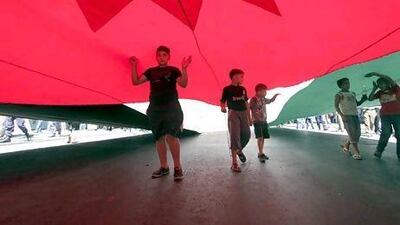Jordanians have taken to the streets to vent anger at the government's second fuel price increase in three months.
The rise comes as Jordan seeks to fill a gap in its budget that widened after the government raised subsidies for basic goods last year.
Yesterday, taxi drivers blocked a main road in Amman as they abandoned their cars and marched to the ministry of transport in opposition to the hike.
It followed a protest on Saturday by hundreds of activists, some clutching placards in protest, demonstrating near the interior ministry.
The increase, announced late on Friday, raised the price of 90-octane petrol by 10 per cent to 0.77 Jordanian dinars (Dh3.99) per litre from 0.70 dinars. The price of diesel rose to 0.55 dinars per litre from 0.515 dinars. The price of 95-octane petrol increased by about 1.5 per cent to 1.15 dinars.
Higher fuel prices will push up the cost of construction across almost all projects, said Mohammed Abu Afifeh, the assistant secretary general of the Jordan Engineers' Association, which represents about 100,000 engineers.
"Most of the materials in the construction industry, like cement and steel, are transported by road, so the square-metre cost of building will increase," he said. "People in Jordan are already suffering from high fuel prices so to increase prices again is totally unacceptable."
In comments attempting to justify the increase, the prime minister, Fayez Tarawneh, said the oil-subsidy system was draining the state budget, particularly in light of higher crude oil prices in the international markets.
"No government in the world likes to increase prices but national interests prompted the government to address the issue of subsidy," he was quoted saying by The Jordan Times.
Since his appointment on April 26, Mr Tarawneh has set about trying to unwind some of the more than US$1 billion (Dh3.67bn) in annual subsidies tightly woven into Jordan's society. Removing tax exemptions and increasing tax rates on luxury goods have been other tools used to help lower the deficit, from 6.8 per cent of GDP last year to a projected target of 5.3 per cent this year.
The government was given some breathing space in July after the IMF agreed to lend it US$2bn but conditions attached to the loan pushed for more budget cuts.
Mr Tarawneh's actions have already proved deeply unpopular. Opposition Islamists warned after the first round of fuel price increases on May 27 political turmoil was likely. The latest move has been equally controversial.
"They are taking away disposable income from people living in an economy which has not seen more than 3 per cent growth in three years and with high unemployment," said Yusuf Mansur, a Jordanian economist and energy consultant.
Many Jordanians are aggrieved as King Abdullah II only announced subsidies for food staples and cuts to fuel taxes after unrest emerged in the region last year.
While Jordan has not been rocked to the same level as some other nearby countries, the Arab Spring has nevertheless affected its economy.
Protests flared in the country briefly last year, deterring investors and tourists, an important source of foreign exchange.
Energy import bills also have risen after more than a dozen bomb attacks since early last year on the Egyptian gas pipeline that supplies Jordan.
More recently, an escalation of the conflict in Syria has hit Jordan's transport industry and sparked an influx of refugees.

